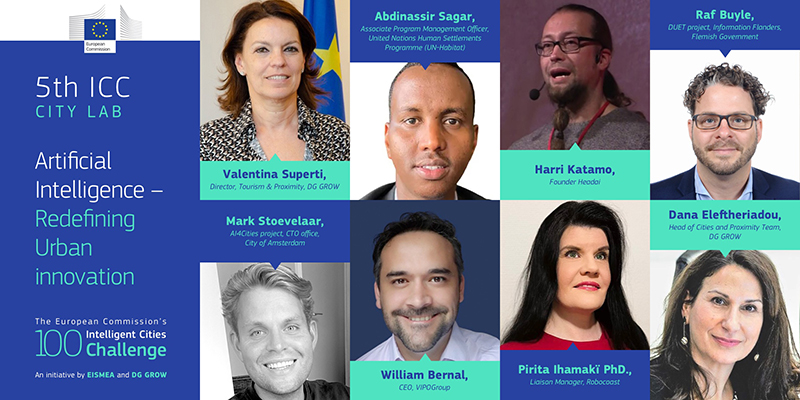
On June 21, the Intelligent Cities Challenge hosted its third and final public session of the 5th ICC City Lab about Artificial Intelligence (AI) to redefine Urban Innovation.
Moderated by Dana Eleftheriadou, Head of the Cities and Proximity Team in DG GROW, the session explored how AI advances people-centric city models, sustainable growth and social resilience and benefits local businesses. Key speakers including international experts, local policy leaders - from the ICC cities of Amsterdam Metropolitan Area (The Netherlands) and Pori (Finland) - and tech entrepreneurs presented latest developments and examples of AI applications to help cities become more sustainable, support local SMEs and enhance social resilience.
They also shared challenges that need to be addressed, such as ethical, safety, trust and data privacy concerns.
Valentina Superti, Director Tourism & Proximity and Digital Transformation of industry at DG GROW, opened the session with an overview of the challenging reality facing cities, and how AI promises to support the cities transitions, as an excellent means to achieve the transformations. She highlighted the importance of the EC strategy that developed the first ever legal framework globally for trustworthy AI and made a plea in favour of “Responsible Digitisation” that addresses the risks associated with AI.
The keynote speaker Abdinassir Sagar, Associate Programme Officer, Innovation & Digital at UN Habitat, highlighted the numerous opportunities and fast pace of AI deployment in cities, mainly for predictive security, transport optimization, virtual agents for better service delivery and enriching digital maps. He also stressed possible risks and challenges including ethical, privacy violations and safety, quality and reliability of AI solutions, issues of transparency, energy consumption, and lack of skills.
To respond to these risks, UN Habitat recommends working within the frame of the UN’s Universal Declaration of Human Rights and to have a people-centric approach.
Cities and AI
Five speakers then took to the floor to present their AI projects:
- Raf Buyle, Information Flanders, presented the DUET project. The Digital Urban European Twins (DUET) project is dedicated to help cities to develop their own digital cities. It will help them visualize how key decisions could affect the flow of the city.
- Wiliam Bernal, CEO of VIPO group, presented the first personal shopper operating with AI. The V-shopper is a tool used to help customers find key pieces from in-store collections.
- Pirita Ihamäki, International Business Manager at Robocoast presented the AI roundtable organised by Pori to help cites share best practices but also to lead them to learn how to navigate within the AI technology.
- Harri Ketamo presented HeadAI which he founded to make data interoperable between individuals, companies, education and labour markets. For instance, it is an easy way to visualise the skills you have within a company and which ones are missing to meet some goals.
- Mark Stoevelaar, CTO office, presented Amsterdam’s work within the AI4Cities. Within this project, the city of Amsterdam developed several applications of AI, mainly with the aim to improve the maintenance of public space. For instance, they are using AI to detect trashes and objects on the streets to then adapt the routing of the pick-up trucks. This is also useful to reduce unnecessary routing and reduce carbon emissions.
Being asked for key recommendations to cities seeking to use AI for their green and digital transformation, speakers agreed that a) transparency on AI uses, data – how it is collected and why – and algorithms - how it works- and b) applying the EU legal framework are key to develop ethical AI, that reassures the citizens and ensures that AI for good.


